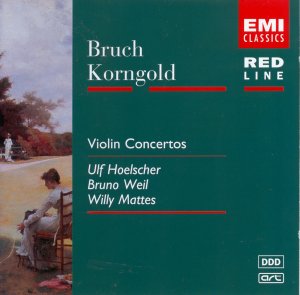This is a upper budget price release in EMI's Red Line
series.
The disc is primarily derived from an early 1970s Korngold
LP fleshed out with 1980s-provenance digital Bruch. Neither orchestra
is in the orthodox top-flight but each does better than creditably and
Mattes and the Stuttgarters play as if possessed in the Korngold. The
Bruch is extremely romantic with a gutsy rip and slash from Hoelscher
and stormy in the manner of the Brahms concerto. It is a good-hearted
performance with Hoelscher's jaguar attack overflowing with confidence,
over-running the odd roughness.
Ten years previously the young Hoelscher was enlisted
by EMI to capitalise on the then fresh Korngold renaissance driven by
the Gerhardt-Palmer film series (RCA). This, at that time, was the only
competition with the raw, voluptuous, overrated and ultimately fatiguing
Heifetz recording. Hoelscher is able to make more of the piece not least
because he is balanced a pace or two back toward the orchestra by comparison
with Heifetz. I seem to recall that Hoelscher was the featured 30 year
old soloist used by Previn in his BBCTV orchestral series when,
daringly, they played a single movement from the concerto. Hoelscher
plays like a angelic jaguar, reminding me, in his molten ferocious flow,
of the tone of Albert Sammons in the Elgar Concerto (recently issued
in the best sound so far by Naxos in a transfer by Mark Obert-Thorn).
Until I played this superb disc again I had forgotten what a radiantly
aggressive interpretation this is. It has been grievously buried by
other more recent readings. The analogue sound still treats Hoelscher
very kindly. How I wish I had tapes of Hoelscher in say the Delius,
certainly in the Elgar and the Walton. For me he is up there with the
Anima-Mathé on Dorian having yet more volatile accelerant and
aggression about him than the Dallas sessions (by no means dull, by
the way) were able to ignite.
The two lighter Korngold pieces are just that - light.
Think in terms of Coates, Respighi (in the Hornpipe) and Montague
Phillips although without the wince-making excesses. The absurd and
macabre Dogberry and Verges movement is compromised a little
by the sound of a Hammond organ. The sentimental sleepy Garden Scene
is most beautifully shaped (as is the Theme from the Theme
and Variations) complete with solo violin (presumably the leader
of the orchestra not Hoelscher). The orchestra are alert and precise.
Hoelscher was born in Kitzingen-am-Main on 17 January
1942 and having learnt the instrument from his father made his concert
debut in 1956. He later studied with Rostal (Cologne), Gingold (Indiana),
Galamian (Curtis) and débuted in the major concert cities between
1971 and 1973. His command of the standard repertoire is wide but also
includes Henze, Spohr, Wolf-Ferrari, Benjamin Frankel and Siegfried
Wagner (the latter three with CPO). What is he doing now?
The liner note has plenty about the violin and about
Hoelscher but nothing about the music.
I hope I have inflamed your interest enough for you
to seek out this lion of a disc.
Rob Barnett


